Key Insights
- Braintrust is a user-owned network that connects talent with hiring clients via a set of smart contracts and open-source software.
- Q3’22 saw a record supply of 23,000 active talent on the Braintrust network, up 45% QoQ and over 26,000 job applications, up 75% QoQ.
- In terms of demand, Q3 ’22 saw 1,247 clients on the Braintrust network, up 11% QoQ.
- While new job postings declined 16% QoQ due to macroeconomic pressures on hiring markets, average project length increased 219, driven by direct hire placements.
- Talent earnings grew steadily over the past four quarters and reached an all-time-high of $18 million, up 3% QoQ.
- To date, Braintrust has facilitated $107 million in cumulative dollar value to talent on its platform.
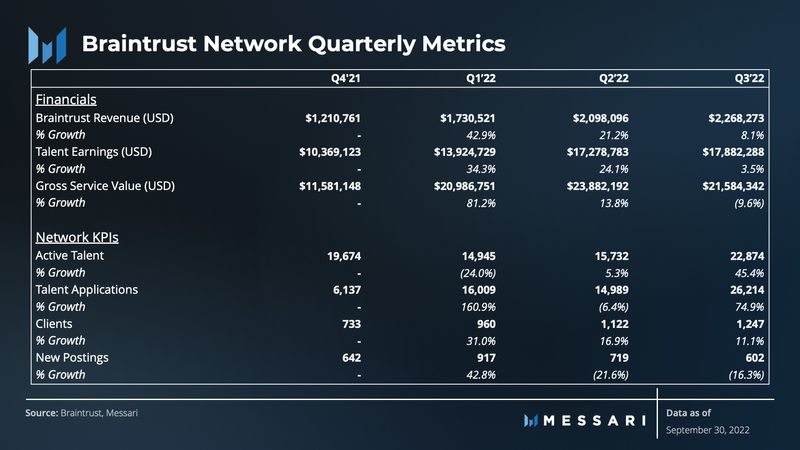
Primer on Braintrust
Braintrust is a decentralized talent network. Although its user experience is similar to traditional talent marketplaces such as Upwork or Toptal, Braintrust is a user-owned network that does not charge talent. Instead, it only charges clients 10%. Braintrust connects talent with hiring clients via a set of smart contracts empowering a permissionless community. Braintrust leverages its native token – BTRST – to bootstrap client and talent engagement.
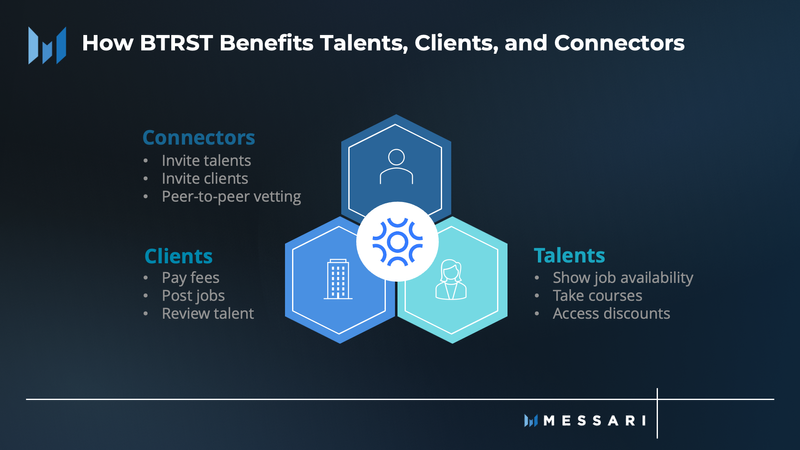
The BTRST token serves as the incentive and governance mechanism for the network’s key participants:
- Clients get their fees converted from fiat into BTRST via the fee converter smart contract; clients use BTRST to post jobs when searching for talent on the network.
- Talent uses BTRST to signal job availability or to access token-gated resources.
- Connectors earn BTRST by introducing, referring, and onboarding clients and talent.
All Braintrust stakeholders can earn BTRST, stake them, or participate in governance (e.g., propose new changes to the network, vote on product roadmaps). BTRST is also used as an incentive to complete profiles and finish educational courses on the Braintrust platform.
Performance Analysis
Network Usage
Braintrust usage can be analyzed from the perspective of activities on both the supply and the demand side of the marketplace:
- Supply: knowledge workers seeking jobs on the Braintrust marketplace
- Demand: clients posting jobs when in need of the services of talent.
Supply
Braintrust’s network supply can be gauged by the activity of talent and their job applications on the network.
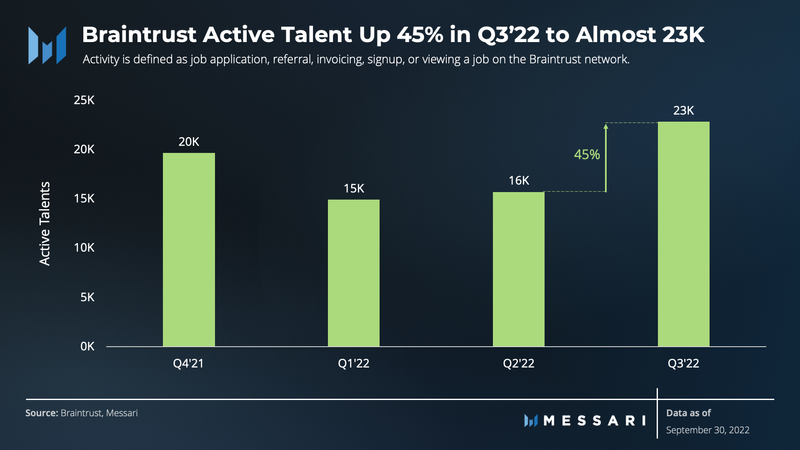
Q3’22 saw a record of nearly 23,000 active talent on the Braintrust network, up 45% QoQ. Activity is defined as talent submitting a job application, referral, or invoice, or when signing up or viewing a job on the Braintrust network.
To apply for a job, talent is required to undergo a community-led assessment to determine if the candidate is suitable for the job. Afterward, Braintrust’s algorithm connects the right candidate with the job based on criteria such as skills, experience, availability, and hourly rates.
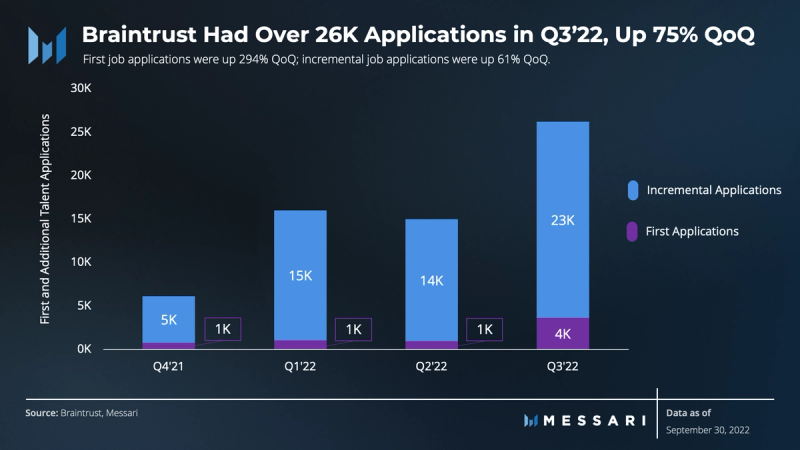
In Q3’22, there was a substantial increase in talent applications. Applications overall rose 75% (from 14,989 in Q2’22 to 26,214 in Q3’22). Specifically, first time job applications rose 294% QoQ (from 918 in Q2’22 to 3,621 in Q3’22) and incremental job applications rose 61% QoQ (from 14,071 in Q2’22 to 22,593 in Q3’22).
This overall increase in job applications shows a healthy growing supply of talent on the Braintrust network.
Demand
Demand for Braintrust services comes mostly from enterprise clients searching for services supplied by talent. Hiring on Braintrust requires clients to post jobs. A recent Messari analysis of talent marketplaces by industry and role can be found here. Job posts are discovered either by talent or by connectors, who can refer candidates to jobs within their personal network.
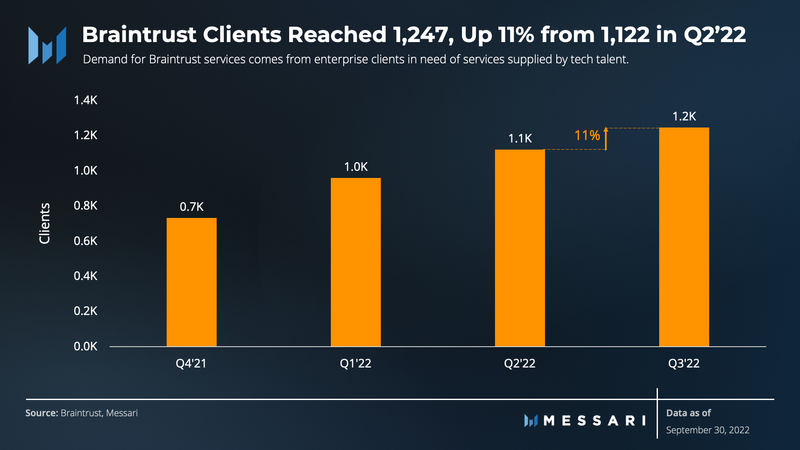
In Q3’22, registered clients on the Braintrust network reached 1,247, up 11% from 1,122 in Q2’22.
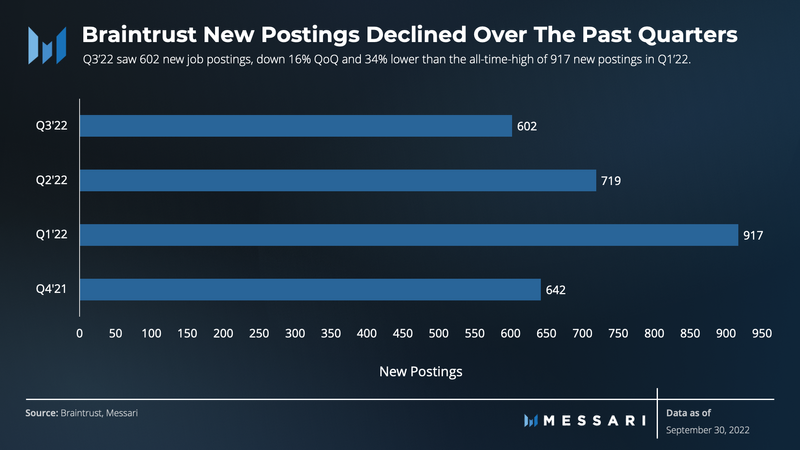
In contrast, new job posts show a declining trend over the past two quarters due to macroeconomic pressures on hiring markets. Q3’22 saw 602 new job posts, down 16% QoQ and 34% lower than the all-time-high of 917 new job posts in Q1’22. This decrease may suggest that a growing portion of job posts is for longer-term projects and full time roles. Indeed, as of October 2022, the average project duration on the Braintrust platform is 219 days. This increase in contract duration may be driven by ongoing engagements that do not require a new posting every time a talent is sought after.
Revenue
Instead of looking at the absolute number of job posts in isolation, it may be beneficial to account for the earnings accrued by talents on the Braintrust network.
Talent Earnings and Braintrust Revenue
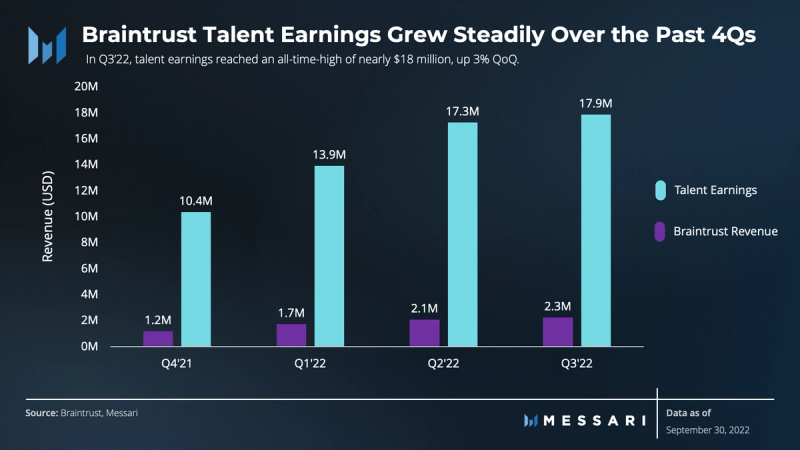
Talent earnings grew steadily over the past four quarters. In Q3’22, talent earnings reached an all-time-high of $17.9 million, up 3% QoQ. Given Braintrust’s focus on more technical talent, the overall macro climate does not appear to have affected the marketplace. As of October 2022, the average project size on the Braintrust platform was nearly $87,000.
Braintrust revenue is accrued after a job is completed and talent is paid the contract value in USD. While the BTRST token doesn’t accrue any network fees, Braintrust takes a flat 10% fee on top of all network transactions to sustain its operations and the community. This fee is paid by the client, representing Braintrust’s revenue. On a cumulative basis, Braintrust registered $8.4 million revenue from all network transactions since July 2019.
Notably, Braintrust does not collect any fee from talent. Instead, the 10% flat fee paid by clients in cash is sent to a smart contract (i.e., the fee converter) and used to buy back BTRST from the open market. The acquired BTRST tokens are then deposited to an on-chain pool managed by the Braintrust DAO, thus strengthening its treasury. This way, Braintrust aims to incentivize network participants to further build the protocol, and, at the same time, contributes value accrual of BTRST, as well as its usage in governance.
Network Growth
Braintrust measures the Gross Service Value (GSV) to account for the growth of its entire network. The metric represents the actual dollar amount that has come into Braintrust before being distributed to the freelance talent. As per Braintrust’s example, if a client hires three developers who are billing at $10K/month, the GSV for the month would be $33k ($10k x 3 developers + 10% Braintrust fee). Notably, the GSV takes into account only the dollar amounts that have been paid by the clients upon the completion of the projects.
In order to account for all the projects that have accepted offers and the anticipated contract value, Braintrust uses Gross Contract Value (GCV). GCV represents all actual and anticipated income into the Braintrust network. For example, if a client hires three developers who are billing at 10k/month, for a 6 month project, the GCV would be $198k ($10k x 3 developers x 6 months + 10% Braintrust fee).
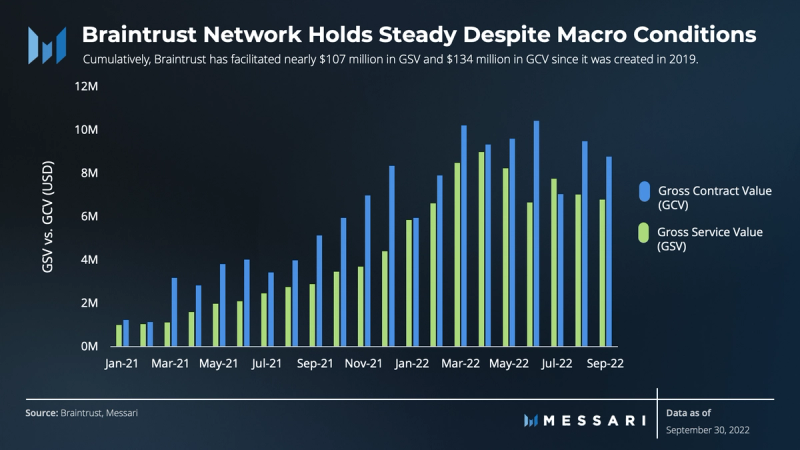
As of October 2022, Braintrust has facilitated more than $107 million in cumulative talent earnings since July 2019. Simultaneously, the cumulative gross contract value was $134 million during the same time span.
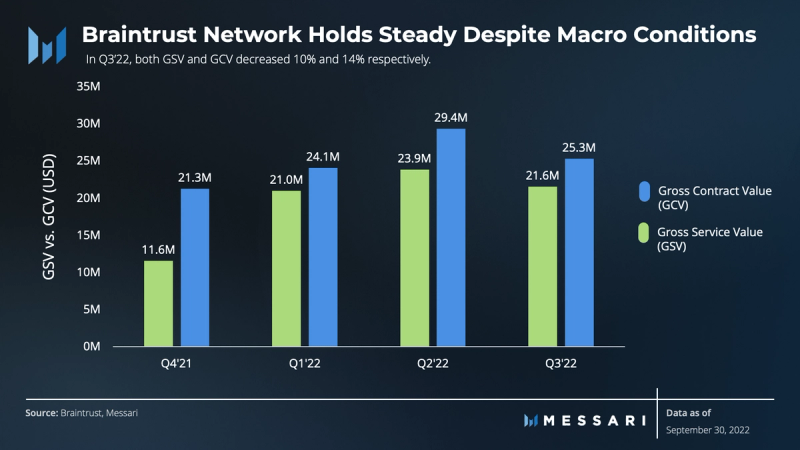
On a quarterly basis, both GSV and GCV decreased 10% and 14% respectively. That said, Braintrust continues to show steady growth of its network despite headwinds from the tough macroeconomic jobs environment. Braintrust does this in three ways:
- focus on marketplace efficiency and effectiveness
- expand into direct hire placement
- upgrade tokenomics to incentivize the full career journey.
Qualitative Analysis
Key Events
As of Sep. 21, 2022, deposits have been enabled for Braintrust (BTRST) on Binance.US. The BTRST token is now listed on the exchange.
Using the new direct placement option for full-time roles, clients on Braintrust are able to hire talent on a near-permanent basis. With this option, clients pay no extra fees if they contract talent for 6+ months and then later hire them on a full-time basis.
Braintrust Professional Network
Today, Braintrust offers talent access to job opportunities paired with matching that reduces hiring cycles for clients. That means, Braintrust focuses on the entire career journey. It evolved from a place where talent gets their job to a place where talent develops their entire career.
Governance
Tokenomics
The total number of BTRST governance tokens is capped to 250 million. The BTRST token distribution is spread across four groups as follows:
- 19% (48 million) reserved for the team and early contributors
- 22% (55 million) allocated to early investors with 2 year lock (1-month cliff)
- 54% (135 million) reserved for community incentives and network rewards
- 5% (13 million) reserved for CoinList public sale
Voting
Braintrust uses both off-chain and on-chain voting to operate changes to its network. Ideas that receive support in Discord conversations are often turned into change proposals to be voted upon by the community. Off-chain voting occurs on Snapshot and consists of two sub-phases: temperature check (yes/no poll) and consensus check (helps refine a proposal to a concrete solution).
Proposals that require technical implementations or changes to the blockchain’s smart contracts usually require on-chain voting before moving to the execution phase.
That is, there is a time lock period of seven-days during which the proposal must be executed. If the results of the on-chain proposal do not suggest a change from the status quo, the topic will be closed. If the results of the on-chain proposal suggest a change, the change suggested in the proposal can be executed on-chain during the seven-day period. Any user can send a transaction to the smart contract to execute the accepted proposal.
Roadmap
Professional Network
As of October 2022, Braintrust enables talent to get career advice and expertise in exchange for BTRST. In 2023, Braintrust plans to support talent to connect with professionals with similar career goals. This will be achieved through recurring learning engagements, governance, and the creation of goal-focused communities. At a later stage, Braintrust plans to create a single connected experience for talent to own their career through advice, connections, jobs, and goal-oriented learning. These activities will be powered by the BTRST token and governed by the Braintrust community.
Marketplace
In its current state, the Braintrust marketplace features new jobs and fosters talent growth through network liquidity and new talent acquisition. Ongoing development efforts include standardized workflows and tools to generate training data to support automated screening and matching algorithms. Braintrust is currently looking for new ways to incentivize its network and distribute ownership. In 2023, Braintrust plans to expand its client base and scale its product-market fit.
Conclusion
Braintrust is a user-owned network that connects talent with enterprise clients via a set of smart contracts and open-source software. Although the Braintrust network is still young compared to incumbents, it has attained product-market fit. To date, Braintrust has facilitated $107 million in cumulative dollars earned to talent on the platform. Talent earnings grew steadily over the past four quarters and reached an all-time-high of $17.9 million, up 3% QoQ.
Through its tokenomics, Braintrust rewards network participation, referral, and aligns both the demand and supply side of the network. Q3’22 saw a record supply of nearly 23,000 active talent on the Braintrust network, up 45% QoQ and over 26,000 job applications, up 75% QoQ. In terms of demand, Q3’22 saw 1,247 clients on the Braintrust network, up 11% QoQ.
While Braintrust is certainly a long way from rivaling established talent marketplaces, its continued growth is promising and sets a precedent for how Web3 two-sided marketplaces could outcompete existing incumbents. Braintrust continues to focus on market efficiency and effectiveness, expansion into direct hire placement and platform innovation across the full career journey.
Despite its solid start, Braintrust faces the same challenge that many Web3 protocols face: scaling in size to truly challenge the incumbent players. In today’s digital job market, competition is fierce to onboard the most talented knowledge workers.
A further aspect that differentiates Braintrust from other Web3 initiatives is the necessity for extra care in the project governance model. Although most DAOs suffer similar risks to a certain extent, a talent network mostly operates on the human layer where the code does not govern many vital activities.
Let us know what you loved about the report, what may be missing, or share any other feedback by filling out this short form.
Looking to dive deeper? Subscribe to Messari Pro. Messari Pro memberships provide access to daily crypto news and insights, exclusive long-form daily research, advanced screener, charting & watchlist features, and access to curated sets of charts and metrics. Learn more at messari.io/pro.
This report was commissioned by Freelance Labs, Inc, a member of Protocol Services. All content was produced independently by the author(s) and does not necessarily reflect the opinions of Messari, Inc. or the organization that requested the report. Paid membership in Protocol Services does not influence editorial decisions or content. Author(s) may hold cryptocurrencies named in this report. Crypto projects can commission independent research through Protocol Services. For more details or to join the program, contact ps@messari.io. This report is meant for informational purposes only. It is not meant to serve as investment advice. You should conduct your own research, and consult an independent financial, tax, or legal advisor before making any investment decisions. The past performance of any asset is not indicative of future results. Please see our Terms of Use for more information.



















